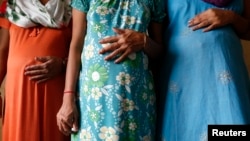SHASHEMENE, ETHIOPIA —
A new roadmap to improve postpartum family planning was presented at the International Conference on Family planning this week in Ethiopia.
Postpartum family planning focuses on providing different kinds of contraceptives for women after childbirth and during the first 12 months of motherhood. The aim is to prevent another pregnancy right away, since that can have a negative health impact on both mother and child.
The U.S. Agency for International Development (USAID) operates a postpartum family planning program in 15 Asian and African countries, including Ethiopia.
Postpartum family planning needs are often overlooked, says Koki Agarwal, director of the Maternal and Child Health Integrated Program.
“If these women were not to use family planning, then they would have shortened birth intervals, which would mean higher risks of mortality for their child," Agarwal said. "So even 30 percent higher risks for children who were born when the intervals are less than three years. And also the mothers themselves cannot recover and have problems with anemia and ability to breastfeed their child, so the child does not get full nourishment.”
The roadmap presented at the conference outlines a tracking system of postpartum contraceptive use, easy-to-understand information materials for families, and recommended practices for health workers.
While development agencies say postpartum family planning is of crucial importance, advocating it is not always easy.
Nurse Tigest Yigezu works for one of the 16 health centers in Ethiopia that have implemented the postpartum family planning program. She makes daily house visits to mothers who have just given birth, and tries to convince families to use contraceptives.
Yigezu says there are no problems convincing families of the short-term family planning contraceptive but that male partners often refuse long-term use. She says it is mostly a cultural and religious issue, as children are seen as a blessing for the family.
Research shows 95 percent of postpartum women around the world want to avoid another pregnancy for at least two years, yet 65 percent do not use contraception.
In Ethiopia, only 19 percent of women with newborn babies use contraceptives. Shashemene Hospital started postpartum family planning advocacy and free distribution of contraceptives last year.
Director Wihid Gebrehiwot says his hospital has helped just 245 women, due to capacity limitations.
“The hospital cannot have all this family planning services," he said. "Even the government cannot provide such amount of free postpartum family planning methods, especially the long-term family planning services. And if you do not have the materials and logistics at hand you can not do anything.”
Gebrehiwot says it is unclear how the free distribution of contraceptives can continue, if the Maternal and Child Health Integrated Program stops providing funding.
Ethiopia has met the Millennium Development Goal target on child survival by reducing its under-five mortality rate by 67 percent in the past two decades. More focus on postpartum family planning could further reduce the number of child deaths.
Postpartum family planning focuses on providing different kinds of contraceptives for women after childbirth and during the first 12 months of motherhood. The aim is to prevent another pregnancy right away, since that can have a negative health impact on both mother and child.
The U.S. Agency for International Development (USAID) operates a postpartum family planning program in 15 Asian and African countries, including Ethiopia.
Postpartum family planning needs are often overlooked, says Koki Agarwal, director of the Maternal and Child Health Integrated Program.
“If these women were not to use family planning, then they would have shortened birth intervals, which would mean higher risks of mortality for their child," Agarwal said. "So even 30 percent higher risks for children who were born when the intervals are less than three years. And also the mothers themselves cannot recover and have problems with anemia and ability to breastfeed their child, so the child does not get full nourishment.”
The roadmap presented at the conference outlines a tracking system of postpartum contraceptive use, easy-to-understand information materials for families, and recommended practices for health workers.
While development agencies say postpartum family planning is of crucial importance, advocating it is not always easy.
Nurse Tigest Yigezu works for one of the 16 health centers in Ethiopia that have implemented the postpartum family planning program. She makes daily house visits to mothers who have just given birth, and tries to convince families to use contraceptives.
Yigezu says there are no problems convincing families of the short-term family planning contraceptive but that male partners often refuse long-term use. She says it is mostly a cultural and religious issue, as children are seen as a blessing for the family.
Research shows 95 percent of postpartum women around the world want to avoid another pregnancy for at least two years, yet 65 percent do not use contraception.
In Ethiopia, only 19 percent of women with newborn babies use contraceptives. Shashemene Hospital started postpartum family planning advocacy and free distribution of contraceptives last year.
Director Wihid Gebrehiwot says his hospital has helped just 245 women, due to capacity limitations.
“The hospital cannot have all this family planning services," he said. "Even the government cannot provide such amount of free postpartum family planning methods, especially the long-term family planning services. And if you do not have the materials and logistics at hand you can not do anything.”
Gebrehiwot says it is unclear how the free distribution of contraceptives can continue, if the Maternal and Child Health Integrated Program stops providing funding.
Ethiopia has met the Millennium Development Goal target on child survival by reducing its under-five mortality rate by 67 percent in the past two decades. More focus on postpartum family planning could further reduce the number of child deaths.




